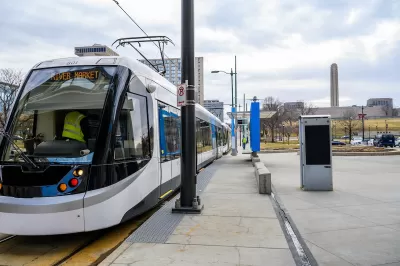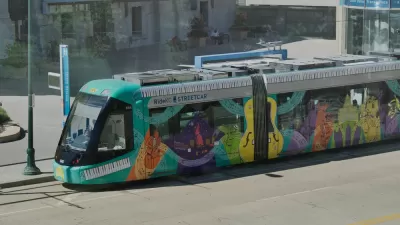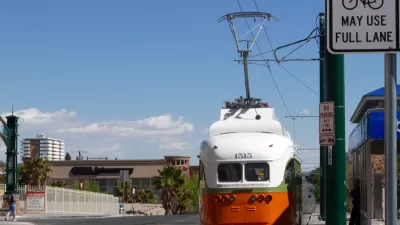An analysis of several streetcar systems shows that they bring different benefits based on a community’s goals.

A University of Kansas researcher says “Modern streetcar systems constructed since 2001 have achieved different outcomes depending on each city’s goals,” writes Dan Zukowski in Smart Cities Dive.
Some cities, such as Kansas City, use streetcars to fill gaps in transit systems and boost ridership by providing fare-free rides and connections to other local transit options. Others, like Atlanta and Cincinnati, built streetcar lines in underdeveloped areas as part of an effort to stimulate economic development and new construction there. Lori Burchett, deputy director for streetcar services with the city of Cincinnati, says that city’s streetcar led to a wave of new development in an area where 90 percent of properties were vacant in 2016.
Zukowski adds, “For streetcar systems to achieve success, Mendez recommended anchoring systems to existing activity centers and tapping into the existing base of transit ridership by making it easy for riders to connect with other transit options through tailored fare policies or infrastructure.”
FULL STORY: Streetcars’ benefits vary by city: panel

Alabama: Trump Terminates Settlements for Black Communities Harmed By Raw Sewage
Trump deemed the landmark civil rights agreement “illegal DEI and environmental justice policy.”

Planetizen Federal Action Tracker
A weekly monitor of how Trump’s orders and actions are impacting planners and planning in America.

How Atlanta Built 7,000 Housing Units in 3 Years
The city’s comprehensive, neighborhood-focused housing strategy focuses on identifying properties and land that can be repurposed for housing and encouraging development in underserved neighborhoods.

In Both Crashes and Crime, Public Transportation is Far Safer than Driving
Contrary to popular assumptions, public transportation has far lower crash and crime rates than automobile travel. For safer communities, improve and encourage transit travel.

Report: Zoning Reforms Should Complement Nashville’s Ambitious Transit Plan
Without reform, restrictive zoning codes will limit the impact of the city’s planned transit expansion and could exclude some of the residents who depend on transit the most.

Judge Orders Release of Frozen IRA, IIJA Funding
The decision is a victory for environmental groups who charged that freezing funds for critical infrastructure and disaster response programs caused “real and irreparable harm” to communities.
Urban Design for Planners 1: Software Tools
This six-course series explores essential urban design concepts using open source software and equips planners with the tools they need to participate fully in the urban design process.
Planning for Universal Design
Learn the tools for implementing Universal Design in planning regulations.
Caltrans
Smith Gee Studio
Institute for Housing and Urban Development Studies (IHS)
City of Grandview
Harvard GSD Executive Education
Toledo-Lucas County Plan Commissions
Salt Lake City
NYU Wagner Graduate School of Public Service





























